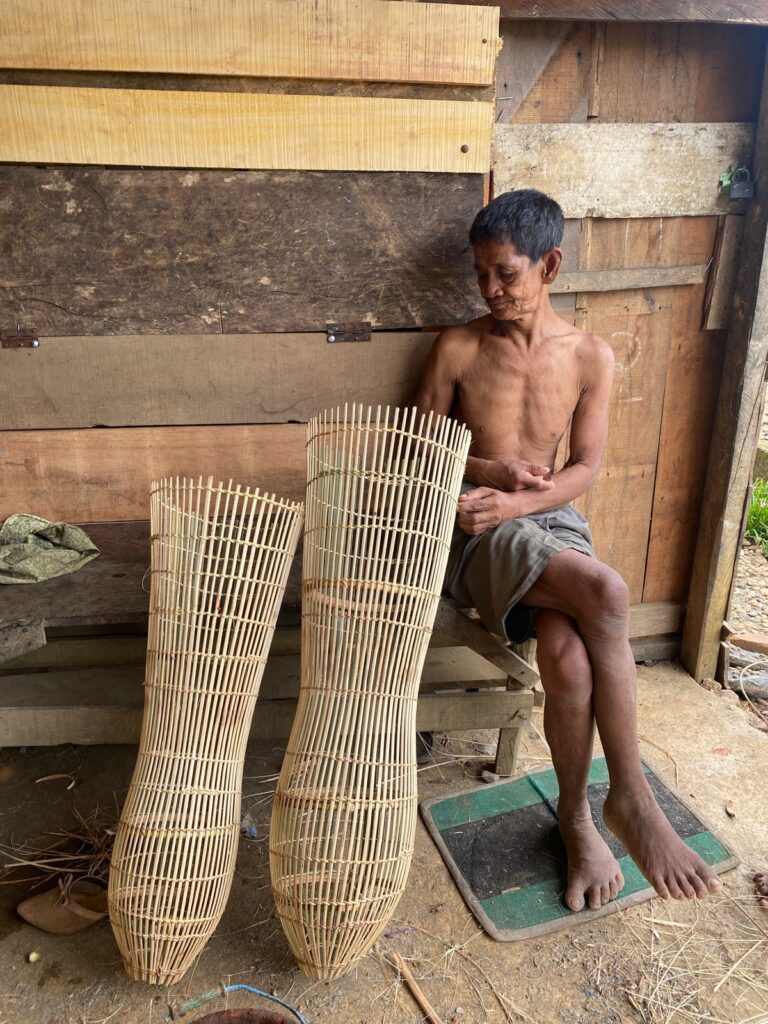Mr. Ilmu's (70 year old) wrinkled hands are still very skilled at weaving thin strips of bamboo into lukah. He occasionally pulled the braided bamboo blades tighter, especially when making knots at the mouth of the wound, the valve, the body of the wound and the lid of the wound. This part of the wound lid will automatically close when a fish is trapped in the wound.
Lukah is a traditional fish trap that is still used by the Anak Dalam Tribe (SAD) community to trap fish in swamp areas or shallow rivers around settlements. Usually several lukahs are installed at several points, between rocks, water plants or around the mouth of the ditch.
The use of lukah also reflects SAD's harmonious relationship with nature, because with lukah, only a small number of fish are caught but are enough to meet daily needs. They do not take it in excess quantities, or in a way that damages the river ecosystem. This is some form of local wisdom from the culture of the Anak Dalam Tribe. They believe that nature can provide its blessings if it can be managed well.
For a long time, Mr. Ilmu has been devoted to making this wound. Apart from using it for the needs of his children and grandchildren, he also often gets orders from local villagers. One lukah fruit measuring one meter long with a diameter of 25 – 20 cm, requires 3 to 4 days to work from preparing the materials to weaving. He usually sells one lukah fruit for around Rp. 80,000 to Rp. 150,000,- adjusted to the size of the wound ordered.
In the past, the wounds he made were made from rattan, but nowadays rattan is increasingly difficult to obtain and expensive; So Mr. Ilmu uses bamboo as raw material for his woven wound.
"It's easier to make a wound using rattan, the result is smoother, stronger and longer lasting. "But rattan is now hard to get," he said.
When he gets an order, Mr. Ilmu usually goes on holiday to the garden or forest. All day he would sit weaving, even continuing until midnight.
"Unfortunately we don't have electricity yet, it's hard to see the woven fabric at night. If there's electricity, maybe the order will be ready in two days!" he added.
Weaving is local knowledge that has considerable potential to be developed in the SAD community. Apart from Mr. Ilmu, there are Mr. Bendung and several masters who are also skilled at weaving products from various types of raw materials such as tassels, rattan and bamboo. Unfortunately young people are less interested in this skill. In fact, if this skill is pursued, the community can produce a variety of handicraft products that can add economic value to them.
Therefore, with the support of the ESTUNGKARA Program, Pundi Sumatra has also prepared a training series for groups in improving product quality and diversification, so that they can then connect products with markets. It's not just a matter of improving product quality and design, groups will also be invited to prepare SOPs for product manufacturing, including jointly agreeing on a selling price so that the sustainability of the product and its benefits are also felt by this community.


